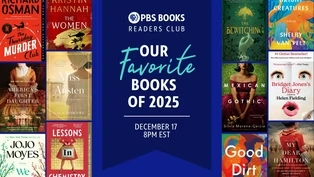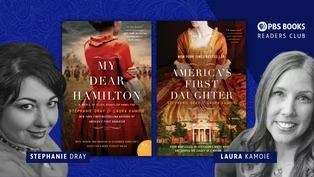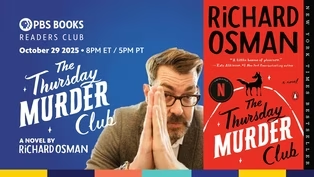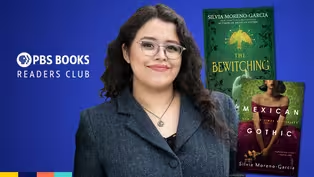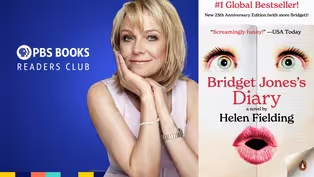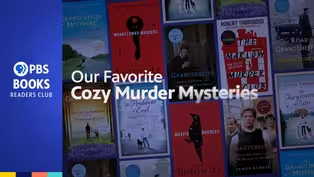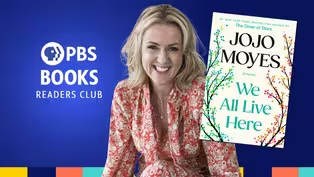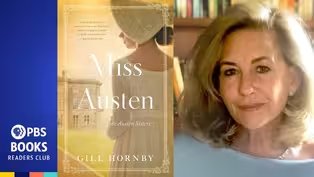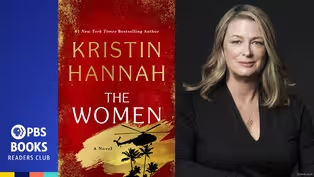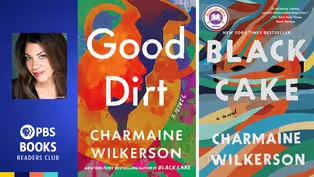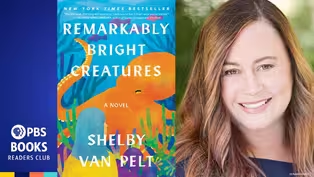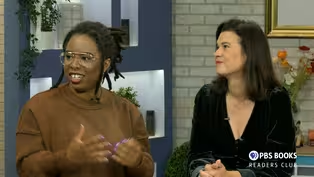
Readers Club | Ep. 207: Lessons in Chemistry | Bonnie Garmus
Season 2025 Episode 52 | 49m 3sVideo has Closed Captions
PBS Books Readers Club welcomes international best-selling author Bonnie Garmus to discuss her novel
PBS Books Readers Club welcomes international best-selling author Bonnie Garmus to discuss her novel Lessons in Chemistry.. Lessons in Chemistry is a mix of humor, social commentary, and heart, exploring themes like feminism, scientific passion, and the struggle for respect in the workplace. It’s a unique and thought-provoking story that combines wit with deeper reflections on women's roles .
Problems playing video? | Closed Captioning Feedback
Problems playing video? | Closed Captioning Feedback

Readers Club | Ep. 207: Lessons in Chemistry | Bonnie Garmus
Season 2025 Episode 52 | 49m 3sVideo has Closed Captions
PBS Books Readers Club welcomes international best-selling author Bonnie Garmus to discuss her novel Lessons in Chemistry.. Lessons in Chemistry is a mix of humor, social commentary, and heart, exploring themes like feminism, scientific passion, and the struggle for respect in the workplace. It’s a unique and thought-provoking story that combines wit with deeper reflections on women's roles .
Problems playing video? | Closed Captioning Feedback
How to Watch PBS Books
PBS Books is available to stream on pbs.org and the free PBS App, available on iPhone, Apple TV, Android TV, Android smartphones, Amazon Fire TV, Amazon Fire Tablet, Roku, Samsung Smart TV, and Vizio.
Providing Support for PBS.org
Learn Moreabout PBS online sponsorshipMore from This Collection
The PBS Books Readers Club is a monthly digital-first series that brings its members into conversations behind the stories of your favorite books & shows. You can watch the online on the PBS App, with extended interviews available for PBS members on PBS Passport.
Readers Club | Ep. 212: Our Favorite Books of 2025
Video has Closed Captions
PBS Books Readers Club celebrates the wrap of its second season with a highlight of 2025 (47m 55s)
Readers Club | Ep. 211: America's First Daughter | Stephanie Dray & Laura Kamoie
Video has Closed Captions
PBS Books Readers Club welcomes co-authors Stephanie Dray and Laura Kamoie (1h 1m 45s)
Wed Oct 29 2025 | Readers Club | Ep. 210: Richard Osman | Thursday Murder Club
Video has Closed Captions
PBS Books Readers Club welcomes celebrity writer Richard Osman to discuss his best-selling novel (52m 44s)
Readers Club | Ep. 209: Silvia Moreno-Garcia | The Bewitching and Mexican Gothic
Video has Closed Captions
PBS Books Readers Club welcomes award winning author Silvia Moreno-Garcia to discuss her new book. (52m 42s)
Readers Club | Ep. 208: Helen Fielding | Bridget Jones's Diary
Video has Closed Captions
PBS Books Readers Club welcomes beloved British author Helen Fielding to discuss her iconic novel (59m 30s)
Readers Club | Ep. 206: Our Favorite Cozy Murder Mysteries
Video has Closed Captions
PBS Books Readers Club hosts a special event sharing Our Favorite Cozy Murder Mysteries (52m 32s)
Readers Club | Ep. 205: We All Live Here | Jojo Moyes
Video has Closed Captions
PBS Books Readers Club welcomes international & New York Times best-selling author Jojo Moyes (57m 37s)
Readers Club | Ep. 204: Miss Austen | Gill Hornby
Video has Closed Captions
PBS Books Readers Club welcomes international best-selling author Gill Hornby to discuss her novel (51m 18s)
Readers Club | Ep. 203: The Women by Kristin Hannah
Video has Closed Captions
PBS Books Readers Club welcomes international best-selling author, Kristin Hannah to discuss novel. (53m 29s)
PBS Books Readers Club | Ep. 202: Good Dirt & Black Cake | Charmaine Wilkerson
Video has Closed Captions
PBS Books Readers Club is delighted to welcome critically acclaimed author Charmaine Wilkerson (55m 29s)
PBS Books Readers Club | Episode 201 | Remarkably Bright Creatures | Shelby Van Pelt
Video has Closed Captions
PBS Books Readers Club launches season two with award-winning author Shelby Van Pelt. (57m 40s)
Readers Club | Our Favorite Books of the Year
Video has Closed Captions
PBS Books Readers Club | Our Favorite Books of the Year (51m 53s)
Providing Support for PBS.org
Learn Moreabout PBS online sponsorship(bright music) - You know how you're in a meeting and you really can't think of what you wanna say, but you know it would be really good if you could think of it right then?
- Right.
- Well, when you're a writer, you can think of it four hours later and write it down, and then it sounds fresh.
But it is true that I had more time to think of a comeback.
(bright music continues) - Hey, and welcome to the PBS Books Readers Club.
- Today, we welcome New York Times bestselling author Bonnie Garmus to discuss her international hit, "Lessons in Chemistry."
- "Lessons in Chemistry" follows Elizabeth Zott, a brilliant young chemist who struggles to be taken seriously in the male-dominated world of the 1950s.
Suddenly a single mother, she reluctantly finds herself as the host of "Supper at Six," a seemingly typical cooking show, but Zott uses this newfound platform to teach housewives chemistry and how to find their self-worth.
- "Lessons in Chemistry" is a thought-provoking mix of humor and heart, all about self-discovery, empowerment, and defying the odds.
- Hi, I am Fred Nahhat alongside Lauren Smith, joined by literary expert and award-winning writer Princess Weekes, and our resident librarian at PBS Books, National Director Heather-Marie Montilla.
- [Lauren] Before we delve into this book, we wanna hear from you.
Share your thoughts on "Lessons In Chemistry" in the comments.
What did you think of this book?
We love reading and responding to your comments in the chat.
It's so fun.
- And join the PBS Books Readers Club Facebook group to connect with other book enthusiasts, share recommendations, and discuss your favorite reads all month long.
- It's the best book club ever.
These folks give such amazing recommendations.
And don't forget, please share this event with your friends because friends do not let friends miss out on great books.
Click Share on Facebook or YouTube right now.
Honestly, it helps us more than you know, and we're very grateful.
- All right, so let's discuss Bonnie Garmus' enlightening novel "Lessons in Chemistry."
So, what'd y'all think?
- I was so pleasantly surprised by everything about this book.
The protagonist, Elizabeth, is so captivating, and I, as you guys know, I've worked in a bookstore forever.
I have seen this book so much, and nothing about the cover prepared me for how thoughtful it was, how sad it was, how romantic it was.
- Mm-hmm.
- There were so many layers to this story that just kept me going.
I listened to the audio book, and I could not stop listening.
It was so addictive, and I love the characters, I love the story, and I love cooking, so it was like a perfect everything for me.
- It was great.
Yeah.
- Yeah, I have to piggyback on what you said, because I work in a library, and this book flies off the shelf.
- Yeah.
- Every time it comes in, it's out, right?
But I agree.
It was brilliant.
I was so surprised.
The complexity of it, the characters, the nod to libraries, the importance of libraries within society.
I can't wait to talk about that.
Dogs.
You guys know I have a dog.
- Six-Thirty the Dog.
- Six-Thirty is an icon.
- All I can think about is how can I teach my dog more words?
(group laughs) Tell me.
You have a dog, right?
- Oh yeah.
- Don't you think?
I mean, how many words does your dog know?
- I don't know, but she's smart.
(group laughs) She's smart.
She outsmarts me on a daily basis, that's for sure.
- Yeah, no.
And I loved Elizabeth Zott's character.
She was so deep.
There were so many things about her, and there was a lot of just levels of womanhood.
- Yes.
- Incorporated into this book.
Because she's trying to find her way at work, and of course she's in the 1950s, but we still have struggles with that- - Absolutely.
- As women, even now.
She wasn't really intending to become a mother, and then she had to sort of figure out how she was going to do that.
And then, I don't know, the whole thing just really spoke to me, because she's navigating so many different parts of being a woman: work, motherhood, romance, and just trying to figure out how to do this.
And she starts off with no help as a mother, too.
- Oh, yes.
- And the importance of her neighbor's companionship, I thought was really eloquent and smart.
And I thought there's so much to discuss.
I can't wait to talk with Bonnie.
- Agreed.
- Yeah, so good.
- So for me, variations on a theme, men behaving badly.
(group laughs) In this case, Western civilization behaving badly, the era, you know, the barriers, but it doesn't seem, no matter what faced, this Elizabeth Zott, in her life, she was able to overcome diversity.
And you know what the hits, they just keep coming.
- Yeah.
- I mean, it's tragic, personal loss, it's the theft of research and other professional gains.
- Yes.
- It is ramping up into a glamorous business that she was nonplussed by.
- I know.
- Television, okay, we'll give it a try.
- Oh my gosh, I wish that I had her immediate comebacks.
You know?
- I know.
Yes.
(Fred laughs) - When you get into an argument with somebody- - Or at least a knife.
(Princess laughs) - And, like, later, you think about, "Oh, I wish I would've said this."
- Mm-hmm.
- She always has the perfect thing to say in the moment.
- Yeah.
- So calm and just steel.
I just, I love her.
- And I wonder if Bonnie had those comebacks immediately, or if she kept on rewriting them, because they were so perfect.
- [Lauren] Oh, we'll find out.
- Yes.
(laughs) - And my favorite, like, smaller thing is the idea of being, like, this smart forward-thinking woman and raising a daughter- - Mm-hmm.
- Knowing what the obstacles are, knowing them personally, and knowing that you didn't get to achieve everything you wanted, but still teaching her to go for it anyway.
- Yeah.
- And I just think like, that was just very moving to me, 'cause that isn't that what we do?
We always want better for the next group.
- Absolutely.
- Yeah.
I mean, the only two characters that end up, at the conclusion of this book, on the honor roll, per se, is Six-Thirty, the dog, and Mad, the daughter.
And it's just characters abound.
It's really, really incredible.
All right, "Lessons in Chemistry" author Bonnie Garmus is standing by to join us in a moment, but first, let's talk about how you can join the conversation.
Sign up for our PBS Books e-newsletter at pbsbooks.org/subscribe for exclusive book recommendations, (bright music) author interviews, and so much more.
It's the best way to get the latest book updates straight to your inbox.
- And did you know that our PBS Book's YouTube channel features hundreds of author interviews and fascinating literary stories?
Geraldine Brooks, Percival Everett on his bestseller, "James," Kristin Hannah on "The Women," Shelby Van Pelt on "Remarkably Bright Creatures," our Book Friends, they're all there on YouTube.
So if you haven't already, be sure to subscribe and immerse yourself in a world of books and authors.
- And if if you love the PBS Books Readers Club, consider supporting your local PBS station.
Now, more than ever, this program and your PBS station are counting on support from viewers just like you, so please, if you can, visit pbsbooks.org/donate to make a gift.
- Pbsbooks.org/donate will take you right to your local station's giving page.
There, among many other thank you gift options, you can support PBS Books directly by selecting one of our special thank you gifts, like the PBS Books Readers Club book bag.
This stylish and sturdy tote is the perfect way for you to carry around your books, e-reader, even a laptop.
It's even got our logo, so you can show your support for public media.
We also have the official PBS Books Readers Club mug, just like we have here on set.
It says on the back, "My Weekend is BOOKED," and it is a crowd favorite.
- Well, and the fun doesn't stop there, because PBS members get access to PBS Passport, the member-exclusive section on the PBS app, where you can stream full seasons of incredible PBS shows, including "Masterpiece" dramas, "The Great American Recipe" cooking competition, and so much more.
And now let's turn the page to our book choice for this month, "Lessons in Chemistry," as we welcome in our guest author, Bonnie Garmus.
Welcome to the PBS Books Readers Club.
Thank you so much for being with us.
- Oh, it's my pleasure.
I'm thrilled to be one of your picks, and I'm thrilled to be here.
- Bonnie, thank you so much for your book.
We're excited to dig in.
So "Lessons in Chemistry" follows Elizabeth Zott, a brilliant chemist born in the wrong time to be taken seriously.
What inspired you to tell this story?
- Well, you know, when I wrote the book, I started it around 2013, and I'd been in a meeting that day where I wasn't taken seriously.
It was a meeting of all men.
It was very typical for me, because I used to work a lot in technology.
And as I was leaving the meeting that day, I kept thinking to myself, "How many other women's talents have been wasted this day, this way?"
And it made me mad enough that when I got back to my desk, instead of working on the thing that I was employed to do, I wrote the first chapter of "Lessons in Chemistry."
(laughs) - That's amazing.
- Perfect.
- Yes.
- I love when revenge.
- Yes.
- Comes together.
- Revenge writing.
- Revenge writing is excellent.
(laughs) - I love it.
- What's your zodiac sign?
(laughs) - Oh, okay, it's Aries.
- Me too!
- Oh!
- When's your birthday?
(Lauren laughs) - Oh, it's this week.
It's Friday, April 18th.
- Oh, happy early birthday.
- Happy birthday!
To both of you.
- Fire sign.
- Yeah, I was like, as a fellow Aries, when you said that, like, I can sense it.
(group laughs) And Elizabeth is such a strong, vibrant character.
I love her way of thinking and speaking.
How'd you come to develop her and her character as your lead?
- Well, you know, when I started writing her, I could hear her very strongly.
And at that time, I really felt like I needed a new role model in my life, for work, and just for my personal life.
I needed some woman that I could really look up to who knew what she wanted and knew who she was, and never questioned, you know, anything, unless she... Elizabeth Zott bases her opinions on facts and evidence, and I kind of love that, so that's where she came from, but really, that was the inspiration.
I needed a role model.
- Just design the woman you want to be in your life.
- Exactly.
- I love that.
- Perfect.
- Calvin Evans was also a very important character in this story.
Can you tell us a little more about his development?
- Yeah.
You know, when I thought about having a romantic interest for Elizabeth, I immediately wanted to create a man who was attracted to her for her mind, not because of the way she looked, and not because of the way she acted, but because of the way she essentially was.
He respected her.
When he was at work, he actually told his boss that he thought she was smarter than he was.
He wasn't intimidated by her smart brain.
And so I thought, you know, what a great role model for men.
(laughs) That Calvin Evans would be the kind of guy who would recognize who she was, and support that.
- I will just say, I'm gonna just give you a compliment.
This is Fred.
Fred has supported me in my career for so long.
- Oh.
- He is Calvin.
It's amazing.
Role model here, right here.
- Well, listen, all the women that surround me are smarter than me.
(group laughs) Including my dearly departed mother, my wife, Wendy, everybody, so it's a strategy, right?
(group laughs) It's definitely a strategy.
So Bonnie, they say never work with kids or animals, so incredible characters in the book.
The scene-stealer, for me, the dog, Six-Thirty.
How did you manifest that four-legged character, and how did you decide on that unique name and the unique perspective?
- Well, I really, as I was writing the book, I didn't really know that Six-Thirty was going to have thoughts, but as I wrote the book, I had a dog at that time.
Her name was Friday, and I read everything I do out loud, and so Friday heard the whole book over and over, and she really enjoyed the dog parts, but I think I started to realize as I wrote it that, not that I understood exactly what she was thinking, but it was really obvious to me that animals have opinions.
They process ideas.
They make decisions every day.
They have brains, like we do.
And we sometimes as humans forget that they have brains and that they do make decisions, and so I decided to add that dog perspective and have a dog comment on us as people, and all the stupid decisions we make, and all the lies we tell, that I think dogs wouldn't quite, you know, they wouldn't quite fathom why we would have to do that.
What would be the point of that?
Why are we always in trouble?
Why are we always going down these weird paths?
And so, I wanted that overlooked perspective to come into the book.
And as for the name, I knew that it was gonna be "Supper at Six," and so I kind of wanted the dog to be the after part of dinner, and also, there's this idea of six-thirty in chemistry as well.
It has to do with temperature.
And so I thought that was a really good way to meld it into Six-Thirty.
(Bonnie laughs) - Love that.
Some parallels between Six-Thirty and our octopus friend, Marcellus- - Right.
- From "Remarkably Bright Creatures."
Have you read that book, Bonnie?
- Oh, I love that book.
- Yeah.
- Yeah.
We talked to Shelby Van Pelt in one of our previous episodes, and it's so interesting to see what the animals think of us.
- Yeah.
- Yes.
I love that.
- And they're so confused.
- They're like, "Again," - They're just like, "Why do you do these things?"
(group laughs) Oh my god.
- I make better decisions than you do.
- Yeah, right?
- Yes.
Yes.
- Yeah.
- Bonnie, the chapter about Elizabeth's experience with early motherhood really stuck with me.
Needless to say, she struggled with her newborn.
I'm a mama myself, and despite having all the support that anybody could ever hope for, it's just a really intense moment in time, and one that even a brilliant scientist like Elizabeth can't easily figure out.
- Yeah.
- Until she finds that she can rely on support from her neighbor, Harriet.
Can you talk to us about why you shaped her experience of motherhood the way that you did, and the importance of support among women?
- Well, I wanted to represent the single mom out there.
There are a lot of them.
And I wanted to represent the fact that you really can't raise a child on your own.
It really does, you know, as they used to say, it really does take a village.
But Elizabeth thought that she could do it all on her own, and that was her weakness.
And so I wanted to bring in the neighbor, an older woman who had very little education and had had a tough life, and have her wisdom be part of what helped and guided Elizabeth.
And that way I wanted to create a row of three women.
One is Mad, she's the young one.
Madeline is being raised without limits.
Then we have Elizabeth, who's well educated, but has limited herself, in a way, because she can't see well into how you raise a child, how you do this.
This is an experiment she's never run, and she doesn't know what the outcome is.
She doesn't know what to do.
And then we have Harriet, who's been through it all, and has this gift that she can give Elizabeth of support.
And for Elizabeth, support is really important.
Female friendship is something that she's not familiar with.
And then she finds it and she realizes how powerful it is.
- We have such expertise featured in this book, rowing, cooking, chemistry were all discussed in great detail, and so specifically.
How much of that detail came from personal experiences, and how much of it was research and finding a way to meld all of those different flavors into this work?
- Well, I'm a rower, so that's the only part that I knew.
- Okay, that makes sense.
- (laughs) Yeah.
- Yeah, I had to put in something I knew about.
And so in terms of chemistry, I'm not a scientist, but I did buy a book, a chemistry textbook off of eBay for like 3.99, and I taught myself (laughs) chemistry, old chemistry, '50s chemistry.
And I had some major accidents along the way, and a few major incidents that required the help of the fire department in London.
- Oh my gosh.
(laughs) - Yeah.
- Please elaborate.
(Fred and Lauren laugh) - Yeah, well, okay, so I'm no longer allowed to say what the experiments were, because they don't want (Lauren laughs) people to copy them.
- Right.
- They're like, people are gonna do this.
- But I did use this book that has essentially been banned.
It's "The Golden Book of Children's Chemistry Experiment."
It was released in the '40s or something, and they had to ban it, because kids were blowing themselves up.
Now, I know why.
That's the book I used.
And so, I did have two accidents in our kitchen in London, and both times, the fire brigade came, and the second time, they brought me a fire extinguisher of my own.
- Oh my gosh.
(laughs) - Aww.
(laughs) - Like, you're trouble.
(Princess laughs) (laughs) Yeah, you need to have this.
(laughs) - Yeah, yeah, yeah.
As for cooking, you know, it's interesting, a lot of people think I must love to cook, but the truth is, I'm not a great cook, and I've never really loved cooking.
I can do it, but I'm not a chef.
But I love and appreciate people who cook, and so I wanted to kind of highlight that what they're doing in the kitchen every day, the reason why it tastes good is because they're chemists.
Whether they know it or not, they're chemists, they're high-level chemists.
- Your book highlighted the important role libraries play in people's lives.
Elizabeth Zott, despite lacking formal education, becomes a successful chemist, thanks to her ability to educate herself using the resources available at the library.
Similarly, Mad Zott seeks answers at her local Carnegie Library.
Why did you include the library in your book, and what role did libraries play in your life?
- Libraries have always been enormously important to me.
As a child, I had a very distinct and loud stutter.
It followed me for most of my life, straight into adulthood.
It took a long time to overcome that, and when you have a stutter, you stay silent.
And one of the things you can do when you're silent is to read.
And I had a librarian who would constantly send a note to my classroom, telling the teacher that she needed me in the library, when what she was doing was saving me from embarrassment and humiliation.
Because of her, and because my parents were huge readers, I became a huge reader, and I thought there was nothing better than reading.
And I realized that you could go anywhere in a book, you could teach yourself anything.
And you know, I'll tell you a quick story.
A woman wrote me, she lives in New York, and she has no formal education.
She never graduated from high school.
And she read "Lessons in Chemistry" and she said, "You know, I work at a coffee shop, and I'm never gonna be anything.
On my whole life, people have told me I will never become anything."
And from her email, I could tell that she was really smart.
Turned out she had self-educated in the library.
And so I told her that Elizabeth would tell her to go to a community college and enroll.
And she did, and today she's in law school.
- Oh, I love that.
- Oh, that's such a good story, I could cry.
- Aww, good story.
- That's so sweet.
- Yeah.
- Wow.
- I listened to the audio book of this, and the dialogue is already so perfect, but when you hear it being spoken, it's so witty, it's so perfect, and it really highlights the personalities of each of these characters.
How did you find the right voice for, not just Elizabeth, but for everyone else in this book?
Because they're all so unique, very specific, and a great balance of like, insightful, charming, and, like, snarky.
You know what I mean?
- Oh yeah, yeah.
(group laughs) - Yeah, there's some snark in there.
To tell you the truth, we got four audition tapes.
You know, this is at a time where nobody really knew about the book.
And this one actress, she's British, by the way, and I think she does a great American accent, she really stood out to me as the voice that I wanted to hear.
And so, you know, we selected her, and I think that she did a really good job.
I know she pronounced Jack LaLanne's name wrong.
She did.
- It's Jack LaLanne.
Sorry to the LaLanne family.
But otherwise, you know, I think she did a wonderful job, and she found those voices herself.
- Mm-hmm.
And in terms of just writing the dialogue for the characters, how many times did it take you to come up with all those, like, one-liners or all of- - [Lauren] That comeback, yeah.
- Those comebacks, yeah.
- Yes, yeah.
- What was, like, writing that like?
- You know what?
I loved writing that, because you know how you're in a meeting and you really can't think of what you wanna say, but you know, it would be really good if you could think of it right then?
- Right.
- Well, when you're a writer, you can think of it four hours later and write it down, and then it sounds fresh.
Yeah, so that's what I was really doing with that.
And, yeah, that part was fun for me, but it is true that I had more time to think of a comeback.
(group laughs) - We call those Zott Zingers.
- Exactly.
- Zott Zingers.
(group laughs) - So your success, fairly recent to this level, and I'm assuming when you reach this level of success and this wide reach as an author, there's a like endless reader feedback loop.
Interesting, in the book, some characters actually have a conversation of how readers often come up with their own interpretation behind an author's works that aren't true or aren't intended.
We're wondering, have you ever had that experience, and have you come across, like, different absurd or bananas theories that really never even occurred to you?
- Well, I've heard a lot of different things, but honestly, most people seem to find themselves in the book, and they really latch on to a certain character.
And then they explain to me how that character represents them.
But I will tell you that what's been most interesting for me in terms of other people interpreting the book is other nations interpreting the book.
And I did a big Zoom call with Korea, several hundred people were on this call.
Maybe it was like 500.
And one of the questions was, "Are all the characters Korean?"
And I said, "Oh, that's a great question, because yes, of course they can be Korean."
And she said, "I knew they were Korean because this is exactly how Koreans act."
And I think that's a sign of creating a universal character.
And then, same thing in Turkey, I got exactly the same question, "Are all of these characters Turkish?"
And I thought, "Wow, that's really great," because it just points to the commonality of our experience around the world, and how we all see our problems the same way, and how we see our solutions in a lot of, down the same paths.
I think most people want safety, they want security, they want love, and they want a good education for their children.
And as I've traveled around the world, I hear that over and over and over, and I hear people working very hard to get there.
- So I wanna acknowledge some of the darker scenes.
Elizabeth Zott has not had an easy life.
She's attacked, really, right in the very beginning of the book.
Some of this must have been difficult to write.
Why did you feel it was important to include these scenes, and how'd you get through it?
- Well, those scenes, the dark scenes were really hard for me to write.
They're very emotional.
And I think in terms of the first, you know, sexual assault scene, one out of five American women will be assaulted in their lifetime.
That's a really, really high statistic.
And I think that sometimes that it gets buried, because people say it can't possibly be that high.
The reason why people think that is that most women don't report their assaults, because they're not believed, or because they're blamed for their assaults.
It was really important for me to put that in, and I really wanted that to be represented.
- As you mentioned before, like, we are still dealing with this today.
You know, we talk about Elizabeth Zott facing discrimination in the '50s and '60s, but why it resonates all over the world is because we are still dealing with that, and even though women are now outperforming in higher education, there are still these massive barriers and so many different goalposts being moved.
So what advice, to channel your own Elizabeth Zott, what advice do you have for women who are trying to find their voice?
You know, you found Elizabeth's voice.
How do you think other people can find their Elizabeth voice?
- You know, I get asked this a lot, especially by young women who really wanna know what they should be doing now.
And this isn't just in the United States.
This is in every corner of the world.
And the one thing I always say is: "You have to speak up."
It's really easy not to speak up, and it's really safe not to speak up, but when you do speak up, you give someone else in that room courage.
And so whether you know it or not, speaking up has a chemical effect on the room.
You become the catalyst for change when you speak.
And I've seen that over and over in meetings, and certainly now in the political arena, when people are speaking up more than ever, hopefully more than ever, it's really important not to be complacent.
And I was just interviewing, no, they were interviewing me, but I started interviewing them, a class of 15-year-old Muslim girls.
And one of them said this really profound thing to me.
She asked the same question, "What should we do now?"
And I said, "Speak up."
And she said, "Yes, because we're 15 years old, and that may seem very young to a lot of people around the world, but we don't have time for anyone else to, you know, keep delaying stalling change.
We have to act now, so we are going to act now."
I thought, wow, 15.
Good for her.
- Yeah.
That is incredible.
- Yeah.
- You have amazing stories.
- Yeah.
(Bonnie laughs) - I've gotten to talk to a lot of, especially a lot of kids, and that has been the greatest thing for me, because I feel very good about this next generation coming up.
They're strong.
- Mm-hmm.
- Yes.
- We gotta be.
(laughs) - Yeah.
- All these recessions.
(group laughs) - We have no choice.
- Yeah, gotta be, yeah.
- Were there any scenes or elements that you wanted to include in the story that didn't make it to the final version?
- Yeah, there was.
One of my goals was to show Elizabeth Zott as a... You know, she was a local force in her community on television, and then it got syndicated, so she was a national force on television.
But I wanted to take her to the next level, and so I used to have a chapter where she actually, she's called by Jackie Kennedy and JFK to talk to the nation about how to prepare for the Cuban Missile Crisis.
Because she's so even and calm, and she tells everyone what they must do, but at the end of it, instead of just addressing the American audience, she addresses Khrushchev himself.
And it was sort of when I was writing, and I was thinking, and this is before, you know, everything with Putin, but I was thinking of a character like Putin, and I really appreciate what she was saying, which is, you know, "You really shouldn't come up against Americans, because once we are united, even if we don't agree with each other and everything, when we're united, we're unstoppable.
And we are unstoppable."
And she lets him have it, but anyway, they cut that.
They thought it was too political.
- Mm, oh, interesting.
(Bonnie laughs) - We're happy to have that little tidbit.
- Tidbit, absolutely, yeah.
- Absolutely.
(laughs) - For sure.
(laughs) What was the most challenging aspect about writing this novel?
- I think, you know, usually it's finding the time.
I was working full time, and I finally realized if I was gonna get serious about this novel, then I had to put myself on a serious schedule of getting up every day at 4:30 and working before work, and- - Mm.
- Wow.
- I know.
I'm a rower, so you know what?
Rowers get up early.
That's kind of good training.
And so that was very helpful.
But that way, you know, you get a lot done before work, and then you go to work and you go, "Oh, well, I hope there's something left over."
- [Princess] Right.
- But yeah, no, it was really the discipline of it.
I think writing a novel is kind of like, I guess, running five marathons back to back.
And I think I didn't really realize how hard it would be, because I'm used to writing very short things.
Like, 50 words a day is really good for a copywriter, and 1,000 words a day is unthinkable, but you see novelists saying, I write 1,000 words a day, and I think, "How?
(laughs) How do you do that?"
I rewrite a lot, so that's part of my process.
- Was that your real job, a copywriter, that you were going to- - Yeah.
- After your writing session?
- Yeah, copywriter and creative director.
Yeah.
- Okay.
- So, where I grew up in Detroit, the famous novelist, Elmore Leonard, was a copywriter at an ad agency, did the exact same thing, and of course, gained so much notoriety, especially in his genre.
I'm also wondering about your sort of parallel experience.
I love the audio book.
I dipped into the hardcover book, and actually watched the TV version first.
I know it became a huge hit, probably pretty quickly for you.
What was that experience like and what is it like now?
- Well, you know, the whole, (laughs) I didn't expect this book to be published, much less, you know, take off, and neither did my agent, really.
She was very honest with me.
You know, as she said, it's kind of a quirky book.
We both believed in it, but we didn't really think it would hit a nerve, and we certainly never believed it would hit a nerve in far away places, in Africa, in the Mid East, we really never saw that coming, in South America.
And so, the whole world seems, in my opinion, to be saying, "We can do better than this.
We can do better."
And I wanted Elizabeth Zott to be so attached to facts and evidence, because I'm attached to facts and evidence.
I miss them.
I wish I could trust what I read all the time, but I can't, and so you have to develop a different skill for understanding how the world is going.
Anyway, for me, that was really important.
And then, it's a great honor to have your book picked up by Hollywood.
It's a huge honor.
It was a shock to me, and so it was great to have it made to a series.
I didn't get to work on the series, but, you know, what an incredible experience.
- How did you choose the title for this book?
Because at first when I saw the book, I would've never thought it would be everything.
How did you pick this?
- Okay, I didn't pick it.
It turned out- - Ah!
- (laughs) It turned out, the name of the book originally was "Introduction to Chemistry."
And when my agent took it to Frankfurt to try to sell it, about two minutes before Frankfurt opened for business, she got a call from them saying, your book is slotting into nonfiction.
Because it's called "Introduction to Chemistry."
- It does sound like a course book.
- Right, yeah.
- Yeah, yeah.
- It does.
It does.
- Yeah, yeah, and you know what?
They were absolutely right to flag that, and she kind of mentioned that to me before: "Should we be worrying about this title?"
And so she actually said, we have two minutes to come up with another title.
And I said, "Okay."
And she goes, "How about 'Lessons in Chemistry'?"
And I said, "Okay."
(laughs) - Wow.
- There you go.
- I love that.
- Right?
- That's fantastic.
- Kismet.
- Don't mess with a copywriter- - It turned out that- - When it comes to creating a title.
- I know.
- Copywriters are key.
(Lauren laughs) - You know, I know.
You know what it is?
I think copywriters, it is so funny, there's so many of us, you know, Salman Rushdie was a copywriter, too.
Kurt Vonnegut was a copywriter.
Joseph Heller was a copywriter.
So there's a whole legion of people who started in copywriting.
- Did you always know that you wanted to be a writer?
That that was your passion?
Or did that realization come later?
- No, I wanted to be a writer from the time I was little, probably because of my librarian, who was showing me ways to communicate, you know, without speaking.
And I wrote my first book when I was five years old, and it's a page long, and I illustrated it.
And that never got published.
(group laughs) - Not yet.
- Not yet, yeah.
Well, believe me, we don't want this one published.
I wrote another book when I was 12, and at that time, my librarian in middle school put my book in the library, and no one ever checked it out.
And I know that, because I checked every day to see if somebody checked it out.
- Aww.
- I know, I know, that's okay.
And then I wrote another book that got rejected 98 times, because yeah, I made a few mistakes.
One, it was a novel that was 700 pages long, and you shouldn't do that for debut.
And then I wrote "Lessons in Chemistry," so I've been at this a while.
(laughs) - I'm always curious what it feels like for a writer to realize that their book really is going to be published, really is being read, really is a bestseller.
Was there a moment in this journey that you felt like, "Oh my God, this is actually happening"?
- Well, you know, it was just so strange.
I just couldn't figure out why people were reading it, or, honestly, it was just, you know, I'm used to writing for big audiences as a copywriter, but you're behind a wall.
You know, you're touting something else.
And so this was really my work.
And so I just kept waiting for the shoe to drop, and then it didn't really drop.
And when I started hearing from people all over the world about how affected they were by the book, and both men and women, the book is particularly a favorite among chemists.
And that's because chemists all over the world have said, "Thank you for not making us just meth producers."
(group laughs) - Yeah.
I gave a copy of your book to my sister-in-law, who teaches chemistry, and she loved it.
- Oh, that's great.
Yeah.
So, you know, no, I never knew that it would be big, and it took a long time to sink in that it would be, or that it was getting big.
But I'm always still kind of surprised by the whole thing, honestly.
I think I knew suddenly that it was more in the zeitgeist when my daughter changed my thing on her phone from saying Mom to saying Global Phenomenon.
- Wow.
I love that.
- Aww.
So cute.
- So cute.
I hope that my kids say that one day.
- Phenomenal mom.
They say it about you already.
- Aw, thank you.
(group laughs) - So Bonnie, you talked about researching the science.
I've been in television a good long time now.
You really nailed the television production segments.
What research did you put into that?
- You know, hardly any.
I don't watch cooking shows, isn't that terrible?
I wanted to create my own show without any kind of in interference from what I would've seen.
But I just remember, as a kid, watching TV, and always having them say, you know, "And we'll be right back after station identification."
And that phrase was just absolutely part of my brain, I think, 'cause I did watch quite a bit of TV when I was a kid, and I just remember that kind of feeling of, you know, people would gather around the TV, because there were so little on, and you would all watch.
And Elizabeth Zott, when she says, "Children, set the table, your mother needs a moment to herself," I was thinking, only Elizabeth Zott would assume that children would watch her cooking show.
But I think my whole purpose with her statement there at the end was that she's teaching the next generation that the mother is an important figure, that she's worthy, that she has value, and that they need to understand that, you know, she's a pillar, not just in the home, but in the community.
- I also wanna acknowledge the importance of mothers need a moment to themselves.
- Yeah.
- Because that, I often feel I never have a moment to myself.
So even the ability for Elizabeth Zott to say that, I was like, "Oh my gosh.
I wish my kids could all hear that."
(group laughs) - Yeah.
- I'll give 'em the audio book.
(laughs) - Yeah, I do, I remember the same, you know, when my kids were little, like, you know, I just need a moment.
Actually I needed weeks, but yeah.
- I think I've said 100 times, "I'm a person, too!"
- Yeah.
(group laughs) - I was a person before I had you.
- No, you're not.
- Yeah, exactly.
- Hey Bonnie, we're talking about moments.
There is a moment in the book that to me they say, "Justice delayed is justice denied," but when it came to Frask, and she revealed the heist of this research and then revealed it later, that was someone, a woman standing up for a woman based on a common experience, a real turning point.
I guess that probably gives you chills when you write that segment.
- Yeah, it did.
You know, I wanted to have...
There's this belief, I think a lot, when we talk about sexism, we think it's just men, but it's not.
Women are very sexist, and women do continue to spread the idea that girls do this and boys do that.
And I want to address that in the book, because I have worked with sexist women, and it's a problem.
So I wanted Frask to learn that herself, being a sexist was not going to help her, and was actually going to hurt other women.
When she finally understands that she and Elizabeth have shared a common experience, and they've both been kept from their careers because of these experiences, then she realizes, "Wait, you know what?
Time for me to help my fellow woman."
And she does.
- Yeah, lifting each other up.
We've had more parallels with that.
We talked with Kristin Hannah about her book, "The Women," recently.
- Oh yeah.
- And I think that was the main motivator for her- - Yes.
- Was talking about how women can lift each other up.
- Yeah.
- We can support each other.
I love those.
- The acknowledgement.
- Yeah, those parallels.
- Yeah.
- Question for you about your process.
It sounds like, as a rower, you're a morning person, but talk to us about your ideal writing setup.
Do you like to write in the morning?
Do you play music?
Do you work in your home?
Do you like to be out and about?
Do you write on, you know, legal paper, like, Kristin Hannah?
- I know.
- That still blows my mind.
- Oh my God.
- What's your ideal setup?
- Oh, I can never, I can't even read my handwriting.
(group laughs) It's so bad.
No, I get up pretty early, and I like to write in the morning.
That's my best time.
I have to have...
Okay, I wanted to be one of those writers that could go to a coffee shop and write, but because I read everything out loud, that lasted one day, it turns out people around you don't want you to read out loud.
So, yeah, yeah, I need silence.
I can't play music, nothing.
I just need complete, complete silence, because when I'm doing, as I write, I'm listening for the characters to tell me the story.
And if there's a lot of distraction, I can't hear them.
- A little more about process.
You've shared that you always wanted to be an author.
What is the most challenging part about being an author and what's the most fun?
- Well, the most fun is when it's done.
(group laughs) - Yep, I agree.
- Amen.
- Yeah, yeah.
The most challenging part is, and I think every author goes through this, there are going to be days when you feel defeated and when you feel that everything you've written was just horrible and terrible.
I go through lots of times where I delete everything that I just wrote.
I always revisit what I wrote the day before every morning, and there are some mornings I wish I hadn't gotten up, because I think this isn't the voice, this isn't what I wanted to say.
But I think, you know, that constant challenge and holding yourself to a certain level can be difficult, but it also builds this kind of resilience and perseverance in you, and you just have to not keep up, and you just have to keep going.
And I think for me, being a rower, that's what rowing represents.
You can't just stop in the middle of a race because you're tired.
You can't just give up on your teammates or anything.
You have to keep going, and you have to do your best stroke as well as you can every time.
And once I kind of translated that into a novel, I saw that it was gonna be harder and harder, but worth it, worth it at the end, you know, when it's over.
(group laughs) Just like rowing.
Oh yeah, great, it's over.
(group laughs) Yeah.
- Bonnie, we are all about book recommendations on the PBS Books Readers Club.
Have you read any good books lately?
We would love to know your recent favorites.
- Okay, so I have so many recent favorites that I had to write them down, but I'll tell you, I wrote this book by an Australian author.
Her name is Madeleine Gray, and it's called "Green Dot," and it is really funny.
She's a great writer.
I think that was her debut book, and I thought it was really, really well done.
I also just finished a book that's coming out in June called "Endling" by Maria Reva, Reva, I think it is, and also "The Homemade God," which is also coming out in June, by Rachel Joyce.
I'm pretty excited to read, I haven't read it yet, but I'm really excited to read Melinda French's new book, Melinda French Gates' new book called, I think it's called "The Next Day."
I'm super excited to read that.
And then one of my favorite authors is Ocean Vuong.
And he's written, I mean, I love everything he's written, but he just finished a book called "The Emperor of Gladness," and I haven't read it yet, but I'm definitely reading it, 'cause I love everything he writes.
- Do you have a favorite book from your childhood?
You mentioned you were a big reader, thanks in part to your librarian and your parents.
Were there any books that sparked your love of reading?
- "Harriet the Spy" was my guide.
I think that's what made me become a writer, in some respects.
It was the most subversive book you could read as a kid.
It's really amazing, the depth she gives to those characters.
And Harriet, of course, keeps a notebook on all the kids that she can't stand at school, and she writes horribly vicious things about them.
I mean, this is the sort of literature you don't often find in kid lit, because often in kid lit, it's sort of been, you know, smoothed over, and you know, everyone's happy, but Harriet's miserable.
She's going through real things, and her friends are going through real things.
And so that book for me was really big.
And also Roald Dahl, I loved him, especially "Charlie and the Chocolate Factory" And "Matilda."
- Yeah.
- Yes, "Matilda."
- "Matilda," great book.
- I love "Matilda."
- If you could invite a character from any book to dinner, who would you invite, and why?
- Oh, it's so funny you should say that, because it would be Matilda.
(group laughs) - Good question.
- Yeah.
Yeah.
When I was writing Mad Zott, I thought a lot about Matilda, and although they're different, I think Matilda would have a lot to teach me.
- Absolutely, and they both love the library.
(Princess laughs) - They do, which I love.
- What's the best advice you've ever received, either about writing or life, or anything in between?
- Oh.
- Rowing.
(laughs) - Yeah, yeah, I mean, I think that probably, you know, my dad was really, well, my parents were really great, I was very lucky to have great parents, but my dad used to say, when we were young and there were four girls, and he was such an athlete, and he wanted us all to be athletic, and we all were, but I mean, I always remember this thing he used to say, which is, "People will try to stop you, and people will try to tell you that you're not good enough, and it's up to you whether you're going to accept that or not.
You don't have to accept what other people say.
You just have to keep going.
Your job is just to keep going."
And I've kind of kept that my whole life, that idea that it's up to us, through thick and thin, to keep going.
Yeah, I think that for me has been really important, and certainly in rowing it's the same.
You have to keep going.
- Well, that's lovely advice from your dad.
- Perfect.
- My dad would just growl at me before soccer games, (Fred laughs) but I think he meant the same thing.
- Yeah.
- Yeah.
- That your dad said more eloquently.
(group laughs) - Yeah, yeah, my dad was more like, "Don't whine, don't cry, (audio distorts) do your best, and just do it.
- Suck it up and put some dirt on it."
- Yeah.
- Right.
Exactly.
- Yeah, suck it up.
- That's a Scott Smith line right there.
- Oh my God.
(Lauren laughs) - But four sisters, like "Little Women."
That's so fun.
I love it.
- I love it.
- Yeah.
- Yeah.
Yeah, yeah, yeah, four girls.
They really wanted a boy, so when I was born, they hadn't picked out a girl name, and on my birth certificate it just says "Girl."
- Aww.
- Oh.
(group laughs) - Yeah.
- There he goes.
- Well, I will say, as probably the only person in the building who remembers Jack LaLanne on television, you can take me back in the '60s anytime, especially when it's to reckon with our progress, you know, through narrative and- - Yeah.
- It's just been so wonderful.
There's so much meaning in there.
I'm just wondering, what do you hope readers take away from your book?
- I really hope, right now especially, that readers take away the idea that change is up to you, and that not only are you completely capable of it, it's your biological imperative to change.
Your body changes every day.
If you really see things in the world right now that you don't like, stand up and speak out and change it.
Don't be afraid, because you are actually biologically, chemically built for this.
You're good at it.
So don't worry about that part of it.
- That's a strong message.
- Perfect.
- Finally, Bonnie, anything you'd like to say to your readers?
- Thank you, readers.
Oh my gosh, I have wonderful readers.
They write me every day.
I have a 15-year-old boy from London who wrote me recently, and you know how they kind of make kids write to authors sometimes?
He wrote me and he said, "Dear Bonnie Garmus, thank you for writing 'Lessons in Chemistry.'
It was way better than 'Lord of the Flies.'"
(group laughs) - High praise.
- I know.
- And I went, "Wow, I really arrived."
But honestly, all readers, all ages, all genders, it's been amazing, and I thank every single one of them.
- That's beautiful.
- Love that.
- Such a wonderful and universal story.
Bonnie Garmus, thank you, thank you ever so much for joining us on the PBS Books Readers Club.
We appreciate it.
- Thanks for the invite.
- What an amazing conversation with Bonnie Garmus.
- Oh, she had the best energy.
So warm.
- Yeah.
- And she had great stories.
- Great stories, and it's like, I love that moment when you realize you made this character.
Like, only her could have done Elizabeth.
- Yeah.
- And that really came through how she spoke about things, her own love of facts, and just her passion and her desire to see people grow and change.
Like, that ending statement, really lovely.
I was very moved by the whole thing.
- I loved how she always knew she wanted to be a writer, and that she wrote a book as so little, and even the fact she wrote a book at what?
12 was it?
- Yeah.
- And it was never taken out.
- In the library.
- Imagine if you had that book today.
I wonder where it is.
- Yeah.
- I know.
- I bet she held on to that.
- Right?
- That's an Aries woman right there.
(laughs) (group laughs) - Yes, that was so, so amazing.
And thank you, Book Friends, for joining us for such a brilliant discussion, (bright music) and while it may not be a lesson in chemistry, I think you'll enjoy our watch-alike this month, "The Great American Recipe."
It's a heartwarming cooking competition, where home cooks from across the country bring their own recipes, cultural background and personal stories to the table.
Much like "Lessons in Chemistry," the show isn't just about cooking.
It's about the connection between food, culture and identity.
Season four is airing now on PBS, and past seasons of the show are available now on pbs.org and through the PBS app.
- Now, we wanna invite you to stay connected by joining the PBS Books Readers Club Facebook group, subscribing to our YouTube channel, and subscribing to our fun and bookish e-newsletter at pbsbooks.org/subscribe.
- And know that these PBS Books Author Talks rely on donations.
You play a huge role in making this happen when you support PBS.
- To join your Book Friends in supporting these events, just click the link in the description or comments, or visit pbsbooks.org/donate.
- You'll be taken to your local PBS stations donation page, where you can find PBS Books swag as our thanks for your donation.
I am personally obsessed with the PBS Books Readers Club book bag.
I use it to haul all my books home from the library.
It's so perfect.
And you can also get the official PBS Books mug, "My Weekend is BOOKED," which is all too true.
Plus, as a member of your PBS station, you'll get access to PBS Passport and incredible shows like "The Great American Recipe" "Masterpiece," and more.
- Okay, book lovers, you probably wanna know what the next book pick is.
Well, as a special thank you to our loyal subscribers, we're gonna make the announcement first in our e-newsletter.
- [Princess] Sign up for the PBS Books e-newsletter at pbsbooks.org/subscribe to make sure you don't miss our next Book Pick announcement, along with other great book recommendations, - And subscribe to our YouTube channel for more amazing reads and hundreds of author interviews.
- We'll see you next time.
Thank you for being a part of the PBS Books Readers Club.
(bright music continues)
Support for PBS provided by:
